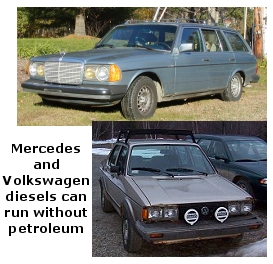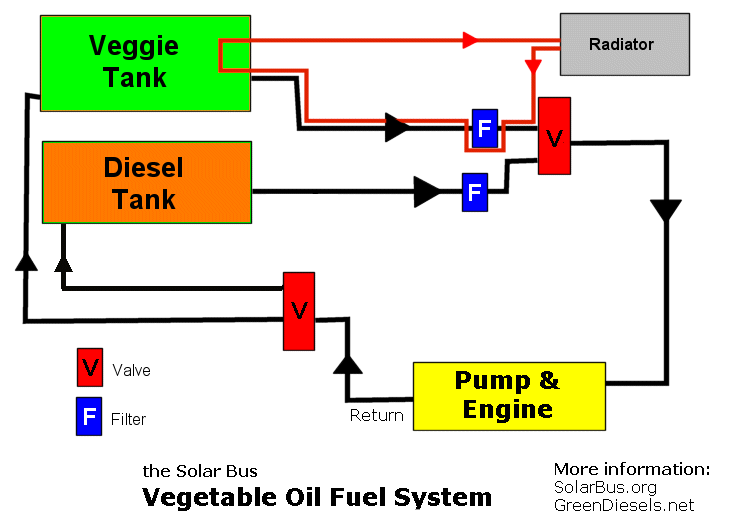 |
|||
|
|
|||
 Are Hybrid Cars Really the Environmental Choice?Diesels offer advantages in terms of cost, reliability, and helping the environment.8.1.06 With today's high gas prices, people are waiting in line to buy hybrid vehicles - cars that have an electric motor to assist the gas engine, which makes for better gas mileage. Some do it to save money, some to save the earth from global warming. Either way, demand for the hybrids is strong and increasing. But for those who really want to drive an environmental car and save a few bucks too, the better choice is to get a diesel. You can burn biodiesel, now available in most cities. Biodiesel is refined vegetable oil that comes from American farmlands and has a lot of environmental benefits. And if you really want to go for it, you can tweek your diesel car to run on "SVO" (Straight Vegetable Oil) without much effort. I know this because I've been driving my 1985 Mercedes on used vegetable oil collected from restaurants for several months now, while some people are still waiting for their Hybrids to arrive. And just recently the 35ft long, 12 ton Solar Bus was adapted to run on pure, sweet smelling vegetable oil. If a big bus can do it, you can too. The advantages of diesels over hybrids are many: Emissions: Which car gets better mileage? This is open to debate. Many diesels get up to 50 mpg. Current studies show that hybrids average about 25 - 30% better milage than their regular gasoline counterparts. That puts them in the same range as diesels. But diesel cars, if running on SVO or biodiesel, are burning a product that comes from plants, which absorbed CO2 while they were growing. And get this - the plants that grew to produce a given gallon of SVO actually absorbed more CO2 than is emitted from your car while you drive. So when the life cycle of CO2 is considered, you are actually removing CO2 from the atmosphere as you go! Vehicle Cost. To get behind the wheel of a hybrid, you're facing a new car purchase, because they are so new and most people like (and keep) them. Edmunds states that "Hybrid cars cost an average of $2,500 to $3,000 more than comparably equipped gasoline vehicles." But to run on vegetable-based fuels, you just have to find a nice used diesel car. Some studies have actually shown that the brand new diesel cars have more problems running on "Veg," and it's better to get one that's "broken in" a little. Used diesels are becoming difficult to find, but if you look hard you'll find one. Surely in less than the 12 week waiting period that typically comes with a hybrid purchase. Vehicle reliability. It's always been known that diesels last longer than regular cars, because the engines have less parts, and turn slower than standard gas engines. Hybrids are the most complicated of all. Fuel versatility. If you have a hybrid, you are still addicted to oil. Dick Cheney smiles every time you drive up to the pump. With a diesel car, there are at least two different fuels you can run on, that do not contain petroleum: SVO, and biodiesel. Diesels can run on fuels that support American farmers rather than oil companies. You can also use regular diesel if you need to, or even home heating oil or kerosene in an emergency! It's true that gas cars can also run on Ethanol, but currently Ethanol availability is almost zero. Fuel Cost. Gas prices continue to climb. Biodiesel is currently about the same price as gas, but promises to remain stable because it's not directly tied to the cost of oil. If you're lucky enough to run your car on SVO, it's usually free, as restaurants have to otherwise pay to dispose of it. The BasicsIt's important to understand the difference between SVO and biodiesel. Biodiesel is a fuel that is derived from vegetable oil, and can run in any diesel car, without any modification to the car. The oil from crops is "refined" by a chemical process, to make it burn in a diesel engine, and the engine does not have to be modified in any way. In most cases you can purchase any diesel car and start burning biodiesel in it immediately. To run your car on biodiesel, you would first have to find a place to purchase it. Currently most major cities have a place to purchase biodiesel, at a price close to regular gas. There are databases of biodiesel availability, the most widely used one can be found at: http://biodiesel.org/buyingbiodiesel/retailfuelingsites/ SVO is different than biodiesel because it is not processed or refined. You can simply pick up used vegetable oil from restaurants and burn it in your car. However, in this case you do have to modify your vehicle a little bit, mainly by installing a second tank in your trunk to hold the vegetable oil and warm it up before it goes into the motor. The proven technology takes about a weekend worth of work. Kits are available, and more and more local "installers" can be found in many areas. Here's a diagram of a typical SVO system. 
Not a Free LunchThere are some hassles in regards to running a diesel on SVO or biodiesel. For SVO, it can get a little messy, picking up oil and finding a place to filter it before you put it in your car (those pieces of french fries don't do too well in the fuel lines). And for biodiesel, availability is growing but you certainly can't find it on every street corner like you can with gas, so you might have to drive a few miles to get it. For most people using these alternative fuels, the minor hassles are worth the benefits. If you've been thinking about a hybrid, or are in line to buy one, give some serious thought to your options. To save the earth, or your wallet, consider a diesel instead. More informationBiodiesel Basics: SVO systems: Gary Beckwith is the Captain of the Solar Bus, an educational solar energy project. He's also runs the Election Justice Center which focuses on the electronic voting machine problem. For more info | |||